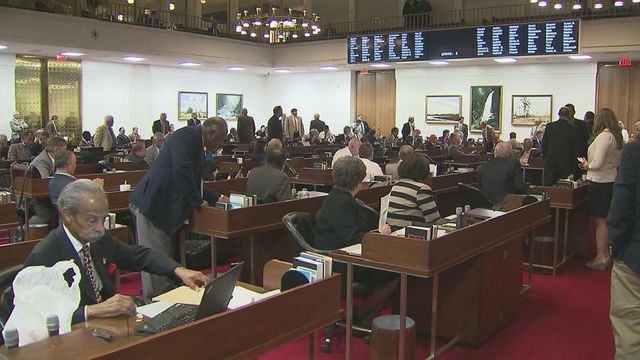House votes to weaken renewable energy requirements
A vote in the House Wednesday night would substantially weaken the state's 2007 law requiring utilities to get a percentage of their power from renewable resources.
Posted — UpdatedThe 2007 Renewable Energy Portfolio Standard, or REPS, law requires utilities in the state to buy an increasing percentage of renewable power, such as solar or biomass, over time. They were required to buy 3 percent renewable as of 2012, 6 percent in 2015, 10 percent by 2018 and 12.5 percent by 2021. Under changes made later, utilities could claim energy-efficiency savings for up to a quarter of that requirement.
The proposal introduced Wednesday night as an amendment to House Bill 760, a regulatory reform measure, would cap the REPS requirement at 6 percent permanently and would allow a utility to claim energy-efficiency savings for up to half of that requirement. Power companies could seek reimbursement from ratepayers for any investments or contracts they've already entered into in order to meet the higher renewables requirements that the proposal repeals.
The measure would also repeal an 80 percent property tax break that solar farms and facilities currently receive. It would cap the rider utilities could charge ratepayers for their REPS compliance at current levels, which is less than $1 a month, for residential customers. And it would set up a "Joint Select Committee on the Long-Term Energy Needs of the State," made up of political appointees of unspecified expertise or background.
The amendment, run by Rep. Charles Jeter, R-Mecklenburg, is similar to several failed attempts by Rep. Mike Hager, R-Rutherford, to repeal the REPS law completely. Hager's most recent repeal attempt was voted down by the House Public Utilities Committee last week. Hager, a former Duke Energy engineer, co-sponsored the amendment.
Jeter said the amendment was agreed to at 1:35 a.m. Wednesday by a group of stakeholders.
"Would the committee look at the benefits of renewable energy as well as the costs?" asked Rep. Ken Goodman, D-Richmond, noting that $300 million has been invested in his rural district on renewables projects spurred by the REPS law.
"It is absolutely the intent to study the good, bad and ugly," Jeter responded. "We want them to look at everything and come back with factual data."
While critics decried the amendment as a partial gutting of the REPS law, Jeter argued that it's the only way to save REPS, which he said is otherwise doomed by an amendment by Hager that was added to House Bill 760 in the House Regulatory Reform Committee on Monday.
Under current law, Duke and other utilities are required to buy solar energy at standard rates from any facility up to 5 megawatts, the size of most solar farms in the state. That requirement has guaranteed a market for the solar boom in North Carolina, but Duke has sought to change it, arguing that it's anti-competitive.
But Hager's addition to the bill, which the committee approved, lowers the must-buy threshold to facilities only under 100 kilowatts. That would allow the utility to negotiate with solar farms to pay less for their power or refuse to buy it at all.
Jeter's amendment removes that change, restoring the market for solar farm power. If the bill were to pass without his amendment, he told the House, "REPS is dead in this state right now."
"You've given us a very mixed bag," observed Rep. Graig Meyer, D-Orange.
The amendment passed easily, 98-18, making the regulatory reform bill – and its changes to the REPS standards – no longer subject to Thursday's crossover deadline. It's expected to be debated further next week.
Related Topics
• Credits
Copyright 2024 by Capitol Broadcasting Company. All rights reserved. This material may not be published, broadcast, rewritten or redistributed.





